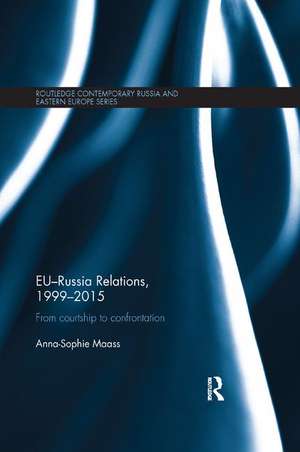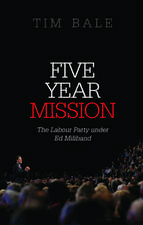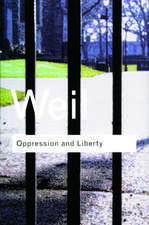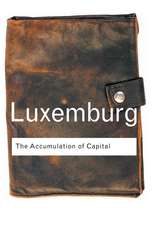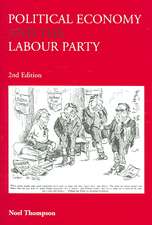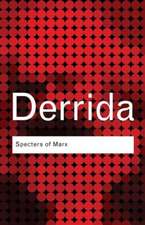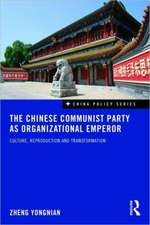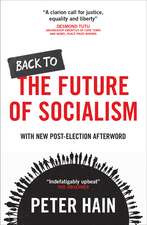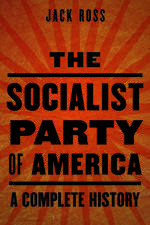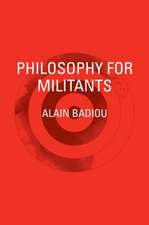EU-Russia Relations, 1999-2015: From Courtship to Confrontation: Routledge Contemporary Russia and Eastern Europe Series
Autor Anna-Sophie Maassen Limba Engleză Paperback – 21 dec 2017
| Toate formatele și edițiile | Preț | Express |
|---|---|---|
| Paperback (1) | 436.14 lei 6-8 săpt. | |
| Taylor & Francis – 21 dec 2017 | 436.14 lei 6-8 săpt. | |
| Hardback (1) | 1162.84 lei 6-8 săpt. | |
| Taylor & Francis – 14 iul 2016 | 1162.84 lei 6-8 săpt. |
Din seria Routledge Contemporary Russia and Eastern Europe Series
-
 Preț: 309.79 lei
Preț: 309.79 lei -
 Preț: 326.49 lei
Preț: 326.49 lei -
 Preț: 326.15 lei
Preț: 326.15 lei - 9%
 Preț: 1010.71 lei
Preț: 1010.71 lei -
 Preț: 321.03 lei
Preț: 321.03 lei -
 Preț: 302.33 lei
Preț: 302.33 lei -
 Preț: 325.21 lei
Preț: 325.21 lei - 9%
 Preț: 934.70 lei
Preț: 934.70 lei -
 Preț: 318.10 lei
Preț: 318.10 lei -
 Preț: 379.30 lei
Preț: 379.30 lei - 18%
 Preț: 1111.51 lei
Preț: 1111.51 lei - 18%
 Preț: 1058.79 lei
Preț: 1058.79 lei - 25%
 Preț: 824.70 lei
Preț: 824.70 lei -
 Preț: 464.54 lei
Preț: 464.54 lei - 18%
 Preț: 950.71 lei
Preț: 950.71 lei - 18%
 Preț: 1168.76 lei
Preț: 1168.76 lei - 24%
 Preț: 130.54 lei
Preț: 130.54 lei - 26%
 Preț: 821.46 lei
Preț: 821.46 lei - 18%
 Preț: 1169.78 lei
Preț: 1169.78 lei -
 Preț: 413.98 lei
Preț: 413.98 lei -
 Preț: 387.49 lei
Preț: 387.49 lei -
 Preț: 406.52 lei
Preț: 406.52 lei - 18%
 Preț: 1059.93 lei
Preț: 1059.93 lei - 18%
 Preț: 1218.26 lei
Preț: 1218.26 lei -
 Preț: 418.13 lei
Preț: 418.13 lei - 18%
 Preț: 1171.89 lei
Preț: 1171.89 lei - 18%
 Preț: 1057.57 lei
Preț: 1057.57 lei -
 Preț: 413.37 lei
Preț: 413.37 lei - 18%
 Preț: 707.96 lei
Preț: 707.96 lei - 18%
 Preț: 1058.65 lei
Preț: 1058.65 lei - 18%
 Preț: 948.84 lei
Preț: 948.84 lei - 18%
 Preț: 706.91 lei
Preț: 706.91 lei - 18%
 Preț: 1059.84 lei
Preț: 1059.84 lei -
 Preț: 488.33 lei
Preț: 488.33 lei - 18%
 Preț: 1056.28 lei
Preț: 1056.28 lei -
 Preț: 390.12 lei
Preț: 390.12 lei - 18%
 Preț: 1053.16 lei
Preț: 1053.16 lei - 18%
 Preț: 1056.28 lei
Preț: 1056.28 lei - 28%
 Preț: 850.91 lei
Preț: 850.91 lei - 18%
 Preț: 1050.78 lei
Preț: 1050.78 lei - 18%
 Preț: 1166.68 lei
Preț: 1166.68 lei - 18%
 Preț: 1058.79 lei
Preț: 1058.79 lei - 18%
 Preț: 1958.23 lei
Preț: 1958.23 lei - 18%
 Preț: 1221.74 lei
Preț: 1221.74 lei
Preț: 436.14 lei
Nou
Puncte Express: 654
Preț estimativ în valută:
83.45€ • 87.14$ • 68.91£
83.45€ • 87.14$ • 68.91£
Carte tipărită la comandă
Livrare economică 15-29 aprilie
Preluare comenzi: 021 569.72.76
Specificații
ISBN-13: 9780815356141
ISBN-10: 0815356145
Pagini: 216
Dimensiuni: 156 x 234 x 12 mm
Greutate: 0.45 kg
Ediția:1
Editura: Taylor & Francis
Colecția Routledge
Seria Routledge Contemporary Russia and Eastern Europe Series
Locul publicării:Oxford, United Kingdom
ISBN-10: 0815356145
Pagini: 216
Dimensiuni: 156 x 234 x 12 mm
Greutate: 0.45 kg
Ediția:1
Editura: Taylor & Francis
Colecția Routledge
Seria Routledge Contemporary Russia and Eastern Europe Series
Locul publicării:Oxford, United Kingdom
Public țintă
Postgraduate and UndergraduateCuprins
1. EU-Russian Diplomacy during the Kosovo War
2. Overcoming "The Chechnya Irritant" In EU-Russia Relations
3. Russia and the Politics of the EU’s Eastern Enlargement
4. The Risks of the Enlarged EU for EU-Russia Relations during the ‘Orange Revolution’
5. Towards Confrontation 2006-2008
6. The Effects of the EU’s Diplomacy in Georgia
7. The Point of no Return? EU-Russia Relations after the ‘Euro-Maidan’
2. Overcoming "The Chechnya Irritant" In EU-Russia Relations
3. Russia and the Politics of the EU’s Eastern Enlargement
4. The Risks of the Enlarged EU for EU-Russia Relations during the ‘Orange Revolution’
5. Towards Confrontation 2006-2008
6. The Effects of the EU’s Diplomacy in Georgia
7. The Point of no Return? EU-Russia Relations after the ‘Euro-Maidan’
Notă biografică
Anna-Sophie Maass is a Post-Doctoral Research Fellow in the European Neighbourhood Policy Chair at the College of Europe, Warsaw, Poland.
Recenzii
"The divergent trajectories of the EU and Russia in the early 2000s set the two entities on the path of confrontation. In this detailed empirical study, Anna-Sophie Maass convincingly demonstrates that a series of external shocks helped reshape their relationship at the same time as the internal evolution of the two brought about a new understanding of their respective actorness in a system in which no fundamental mode of reconciliation had been devised. This important work represents essential reading for anyone seeking to understand the dynamics of the relationship between the EU and Russia."
Richard Sakwa, University of Kent, UK.
"The question why the EU's and Russia's relations ended up on a conflictual path is one of the most pressing ones for our generation.
This book provides a multi-layered analysis of the road from initial promise to the current bitter mutual disappointment and recrimination.
It is a sobering account that should be required reading for everyone interested in the future of EU-Russia relations."
Hiski Haukkala, University of Tampere, Finland.
"This is an important book that speaks to a wide audience across disciplinary boundaries. Expertly following the contours of the EU’s troubled relationship with Russia over the past two decades, Maass’ analysis is rigorous and based on a wealth of primary material. Its value goes well beyond a simple retrospective of recent conflicts and diplomatic impasses; this is a study that contextualizes the current ‘ice age’ in the EU’s relations with Russia and offers significant insights into the dynamics that have contributed to its emergence."
Dimitris Papadimitriou, University of Manchester, UK.
Richard Sakwa, University of Kent, UK.
"The question why the EU's and Russia's relations ended up on a conflictual path is one of the most pressing ones for our generation.
This book provides a multi-layered analysis of the road from initial promise to the current bitter mutual disappointment and recrimination.
It is a sobering account that should be required reading for everyone interested in the future of EU-Russia relations."
Hiski Haukkala, University of Tampere, Finland.
"This is an important book that speaks to a wide audience across disciplinary boundaries. Expertly following the contours of the EU’s troubled relationship with Russia over the past two decades, Maass’ analysis is rigorous and based on a wealth of primary material. Its value goes well beyond a simple retrospective of recent conflicts and diplomatic impasses; this is a study that contextualizes the current ‘ice age’ in the EU’s relations with Russia and offers significant insights into the dynamics that have contributed to its emergence."
Dimitris Papadimitriou, University of Manchester, UK.
Descriere
This book traces the development of EU-Russia relations in recent years. It argues that a major factor influencing the relationship is the changing internal dynamics of both parties, in Russia’s case an increasingly authoritarian state, in the case of the EU an increasing coherence in its foreign policy as applied to former Soviet countries which Russia regarded as interference in its own sphere. The book considers the impact of conflicts in Kosovo, Chechnya, Georgia and Ukraine, discusses the changing internal situation in both Russia and the EU, including the difficulties in overcoming fragmentation in EU policy-making, and concludes by assessing how the situation is likely to develop.
